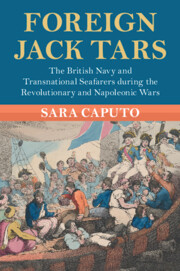 Foreign Jack Tars
Foreign Jack Tars Book contents
- Foreign Jack Tars
- Modern British Histories
- Foreign Jack Tars
- Copyright page
- Dedication
- Contents
- Figures
- Tables
- Acknowledgements
- Introduction
- Part I The State
- Part II The Nation
- 3 A Babel and a Gehenna
- 4 ‘Complexions of Every Varied Hue’
- 5 ‘They Cannot Keep the Sea beyond a Passage’
- 6 ‘From among the Northern Nations Alone’
- Part III Displacement
- Conclusion
- Book part
- Bibliography
- Index
3 - A Babel and a Gehenna
Languages and Religions
from Part II - The Nation
Published online by Cambridge University Press: 03 November 2022
- Foreign Jack Tars
- Modern British Histories
- Foreign Jack Tars
- Copyright page
- Dedication
- Contents
- Figures
- Tables
- Acknowledgements
- Introduction
- Part I The State
- Part II The Nation
- 3 A Babel and a Gehenna
- 4 ‘Complexions of Every Varied Hue’
- 5 ‘They Cannot Keep the Sea beyond a Passage’
- 6 ‘From among the Northern Nations Alone’
- Part III Displacement
- Conclusion
- Book part
- Bibliography
- Index
Summary
Chapter 3 examines two features deemed constitutive of ‘national characters’ in the eighteenth century: language and religion. Many naval recruits, both from abroad and from the British Isles and Ireland, were not native English speakers, and sometimes did not understand the language. Yet naval English was a technical argot, blurring language divides, and shipboard structures and workflows, combined with a shared professional background, made linguistic competence a secondary concern. In fact, it was men otherwise known as ‘foreigners’, but speaking perfect English, who were potentially seen as suspect, because of their upturning of expectations. Religious difference, too, was generally unproblematic. Unlike other European fleets, the Navy ranked devotion relatively low among its priorities and routines. Although Catholics were theoretically banned from serving, this law was policed only in the case of officers, and some practical accommodations were even provided for Catholic common seamen. Overall, cultural differences often mattered to individuals. However, the naval service pursued efficiency, and its discipline was very efficacious in flattening or accommodating difference, making any diversity relatively marginal to shipboard rhythms. Royal Navy ships could thus become just another part of a maritime world in which various languages and faiths met and mingled.
Keywords
- Type
- Chapter
- Information
- Foreign Jack TarsThe British Navy and Transnational Seafarers during the Revolutionary and Napoleonic Wars, pp. 83 - 116Publisher: Cambridge University PressPrint publication year: 2022
